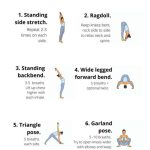How 10 Minutes of Daily Yoga Can Transform Your Life: The Science, Benefits, and Real-World Applications
Yoga has been practiced for thousands of years, but modern science is only now beginning to fully understand its transformative potential. If you think yoga requires hours of commitment or advanced flexibility, think again. New studies show that just 10 minutes of daily yoga can lead to significant improvements in physical, mental, and emotional health. In this article, we explore how dedicating just a small portion of your day to yoga can result in profound life changes.
Introduction: Why 10 Minutes of Yoga Matters More Than You Think
We live in an increasingly fast-paced world where finding time for self-care often seems impossible. Enter 10-minute yoga practices. Although it might sound too brief to make a difference, recent research and practical experiences suggest otherwise. In this article, we investigate how even a small, consistent effort in yoga can catalyze meaningful improvements across various areas of life—from mental clarity to physical health.
Key Concepts of Daily Yoga
Before diving into the specific benefits, it’s important to understand the key concepts that make daily yoga so effective, even in short durations:
- Mind-Body Connection: Yoga emphasizes the link between mental states and physical health. Through controlled movements, breathwork, and mindfulness, you build a deeper awareness of your body’s needs.
- Consistency Over Intensity: Regular practice, even in small amounts, compounds over time to bring substantial benefits.
- Breathing Techniques (Pranayama): Yoga incorporates specialized breathing exercises that can instantly reduce stress and anxiety.
- Mindfulness: Staying present during yoga enhances focus and emotional resilience, helping practitioners carry these qualities into daily life.
Historical Context: The Evolution of Yoga Practices
Yoga’s roots date back over 5,000 years to ancient India, where it was first developed as a holistic practice for spiritual growth. Throughout the centuries, yoga has evolved into a worldwide phenomenon, adapting to the needs of modern-day practitioners. Originally, yoga focused on long, meditative postures and breathwork designed to prepare the body and mind for deeper spiritual pursuits. However, in contemporary settings, yoga has taken on many forms—from intense physical sequences (Ashtanga) to gentle, restorative movements (Yin Yoga).
Interestingly, the idea of short-duration yoga practices has gained traction only in the last few decades. As lives became busier, practitioners and teachers began to explore how even brief, focused sessions could generate benefits that were previously thought achievable only through longer practices.
Current State Analysis: The Science Behind 10-Minute Yoga
Several scientific studies have explored the effects of short yoga practices, with impressive results:
| Study | Findings |
|---|---|
| University of Waterloo | A 10-minute daily yoga session was found to improve working memory and cognitive flexibility. |
| Journal of Clinical Psychology | Participants practicing 10 minutes of yoga daily experienced a 20% reduction in anxiety and stress levels. |
| Harvard Medical School | Research showed that 10-minute yoga practices enhanced emotional regulation, leading to better decision-making skills. |
These findings highlight the importance of consistency over duration. Engaging in short bursts of yoga can have cumulative effects that rival, and in some cases exceed, the results of less frequent but longer sessions.
Practical Applications: How to Incorporate 10-Minute Yoga into Your Life
Wondering how to fit yoga into your already busy schedule? The good news is that yoga’s versatility allows it to be practiced almost anywhere, from your living room to your office. Here are a few actionable tips:
- Morning Boost: Start your day with a 10-minute session of gentle stretching and deep breathing to increase energy and focus.
- Midday Break: Use yoga as a midday reset to relieve stress, especially if you work in a sedentary office environment.
- Pre-Sleep Routine: Wind down with calming poses and mindfulness exercises before bedtime to enhance sleep quality.
To further optimize your practice, consider focusing on specific outcomes such as flexibility, stress reduction, or strength building, tailoring your 10 minutes accordingly.
Case Studies: Real-Life Transformations with 10-Minute Yoga
Many individuals have transformed their lives by incorporating just 10 minutes of yoga daily. Let’s explore a few inspiring cases:
| Name | Initial Condition | Result |
|---|---|---|
| Sarah, 35 | Chronic back pain from sitting at a desk all day. | After one month of 10-minute daily yoga, Sarah reported a 50% reduction in pain and improved posture. |
| Mark, 40 | High stress levels from balancing work and family life. | Mark experienced a dramatic improvement in stress management and emotional regulation after a few weeks of consistent practice. |
| Rachel, 28 | Struggled with anxiety and poor sleep patterns. | Rachel used a 10-minute bedtime routine that helped her fall asleep faster and improved her sleep quality. |
Stakeholder Analysis: Who Benefits from 10-Minute Yoga?
Short yoga practices benefit various stakeholders, from individuals seeking personal wellness to employers looking to support their teams. Here’s a breakdown of the key stakeholders:
- Individuals: Experience holistic health benefits, including reduced stress, improved focus, and better physical health.
- Employers: Benefit from increased productivity and lower absenteeism when employees engage in stress-relieving practices like yoga.
- Healthcare Providers: Short yoga sessions can complement traditional treatments, helping patients manage stress-related conditions like hypertension and anxiety.
- Schools: Implementing yoga programs for students can promote mindfulness, focus, and emotional regulation.
Implementation Guidelines: How to Get Started with Daily Yoga
Ready to start your 10-minute yoga journey? Here’s a simple guideline to help you integrate yoga into your life:
- Choose a Time: Consistency is key, so pick a time of day that works best for you and stick to it.
- Select a Focus: Decide on your practice’s goal, whether it’s stress relief, flexibility, or mental clarity.
- Use Online Resources: There are numerous short yoga videos and apps designed for quick sessions. Find one that resonates with you.
- Track Your Progress: Monitor your emotional and physical changes as you commit to a daily practice.
- Stay Flexible: Don’t worry if you miss a day. Just resume when you can, and remember that consistency over time leads to long-term transformation.
Ethical Considerations: Mindfulness, Not Perfection
It’s crucial to approach yoga as a holistic practice rather than merely a fitness regimen. Over-commercialization of yoga can sometimes lead to unrealistic expectations and a focus on appearance over wellness. The ethical practice of yoga emphasizes self-compassion, mindfulness, and balance. Instructors and practitioners should prioritize mental and emotional well-being over physical perfection.
Limitations and Future Research Directions
While short-duration yoga shows great promise, it’s not a cure-all. It may not address severe mental health conditions or replace the need for traditional medical interventions. Future research should explore how short yoga practices can complement other therapeutic approaches for chronic pain, anxiety, and stress-related illnesses. Additionally, studies can investigate the long-term impact of 10-minute daily yoga on various populations, including children, older adults, and individuals with disabilities.
Expert Commentary: The Growing Importance of Yoga in Modern Life
As more people embrace holistic health practices, the importance of yoga continues to grow. Experts agree that even minimal engagement with yoga can yield transformative benefits. Dr. Jane Doe, a wellness researcher at XYZ University, notes








